In recent weeks, Jessica Jones, the eponymous heroine of Netflix’s new series with Marvel, has been widely hailed as an “antihero.” Though Jones has superpowers, from episode one she’s a canny, if scrappy, self-made entrepreneur who runs her own detective agency (in the words of Vulture’s Jenny Raftery: “She boozes. She screws. She needs cash — and fast”). Emotionally, she’s kind of a train wreck (for a briefer on everything she drinks in the first season, head to BuzzFeed). This brand of gritty realism has often characterized male television characters over the past decade, and cinematic supermen and noir detectives too. But when a powerful woman is morally gray, it is something of note. Jones is “The Female Antihero We Need,” “Our First Real Anti-Superhero,” and “The Antihero We’ve Been Waiting For.”
In sharp contrast to CBS’s Supergirl, or “Jewel,” the superhero character Jones played in the original Marvel comic book, Jessica Jones cuts against the pop-cultural paradigm that female superheroes are smiley, sexy-but-wholesome, strong “female role models.” She does not wear a nakedly impractical costume that shows off her body. She has no intention of being eye-candy. Jessica Jones does not even smile.
But does this make her the “female anti-hero we’ve all been waiting for“? If refusing to smile—or wearing her customary non-costume of jeans and a leather jacket—makes Jones an “antihero” at the beginning of the first season, it’s a term that doesn’t fit her by its end. In the first season, it’s Jones’ failed attempt to play antihero that demonstrates how radically different she is. For Jones, behavior that fits the suffering-superhero mold is a symptom of actual suffering, and an emotional crutch she must learn to give up. To the series’ credit, she does.
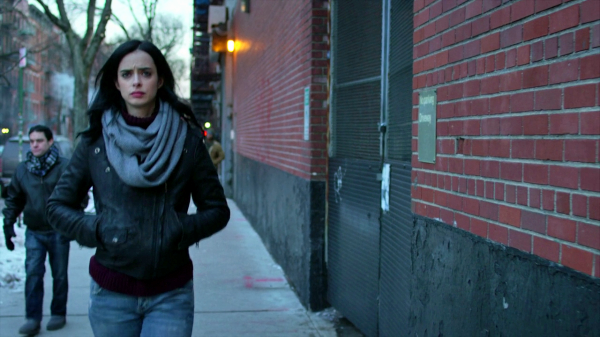

In the context of this “Golden Age” in television, it’s not surprising that critics have framed Jessica Jones’ superficial resemblance to an antihero as a compliment. Books like Brett Martin’s Difficult Men and Alan Sepinwall’s The Revolution Was Televised have given borderline-sociopathic men like The Sopranos‘ Tony Soprano and Breaking Bad‘s Walter White a place of honor in popular culture. Meanwhile, the success of “bad boys” at awards ceremonies has made some commentators wonder whether it isn’t a liability to have a purely good male character headline an ambitious show anymore. What makes broody, angsty male leads so “great”? Seemingly how morally and ethically corrupt they are: At best, characters like Mad Men‘s Don Draper and Boardwalk Empire‘s Nucky Thompson are bad husbands, fathers, and co-workers; at worst, they are killers and rapists. As Adam Kotsko puts it, we seem to love sociopaths.
Nor is it surprising that Marvel would eventually edge into the antihero market—these days, it’s customary for superheroes to play against type. Now that adults constitute the primary market for superhero stories, it is harder than ever to align the “American way” with truth and justice. Batman has become a figurehead for the ambiguities of the American security state; Superman resembles a dark knight more than Christopher Reeves’ do-gooder. So many classic superheroes have been grittily re-booted, indeed, that a good guy who doesn’t lack all conviction is a refreshing change. The fact that Captain America is exactly the same—that he’s literally been frozen in a block of ice for a half-century—makes him a compelling character, because he’s a glaring anachronism.
Being an antihero is not Jessica Jones’ personality: It’s her curse.
So while it’s refreshing to find a female superhero whose flaws and complexities are treated as lovingly as a man’s (“She’s not an object for our liking or hating like so many female characters on television and in film,” Emily Lackey wrote for Bustle), there’s a sense that a woman playing an antihero demonstrates progress too: “If that isn’t the kind of woman we need more of in television, then I don’t know what is,” she added. That women have not traditionally played the antihero archetype nagged Jessica Jones‘ showrunner, Melissa Rosenberg. She told Rolling Stone: “Networks have been slow to let women into that circle … to allow for a woman to be morally ambiguous and at times ugly as a person in the same way that Tony Soprano and Walter White were.”
And yet: Jessica Jones, though arguably “ugly as a person,” is not a sociopath. Tony Soprano and Walter White killed people and ruined lives in service of their own egos and wills-to-power. Jessica Jones is different: her antisocial personality is a product of her overdeveloped conscience—in the series’ first season, she pushes people away to keep them safe. Being an antihero is not Jessica Jones’ personality: It’s her curse.

Unlike male antiheroic comic-book mainstays like Batman, Daredevil, or Luke Cage, Jones’ brooding, ruthless traits stem not from dead parents, but from the trauma of violation. At the start of the show, Jones, who is supernaturally strong, has given up using her powers to be a hero; she makes a living as a private investigator, taking pictures of cheating spouses to assist divorce attorneys in profitably breaking up families. It’s legal, if not particularly proud work. And though there’s a pretty standard, tragic explanation for her superpowers (her parents died in a car accident, which also gave her special abilities), her real “origin story” occurred later in life. A year before the show begins, she was kidnapped by the superpowered criminal Kilgrave (David Tennant), who not only raped and abused her, but used his power of mind control to turn her into his willing accomplice in murder. In Breaking Bad and The Sopranos, Walter White and Tony Soprano, respectively, rose above good and evil like Nietzsche’s Übermensch. Jessica Jones, on the other hand, is antiheroic because she hates and blames herself.
Indeed, Jones is so thoroughly traumatized that she can be frustrating to watch. In the first season, she’s a disaster in action—all impulsivity, bad plans, terrible gambles, and poor decisions. Her erratic behavior opens some gaping plot-holes: why, for instance, does Jones work so hard in the first few episodes to find a specific kind of rare anesthetic, when literally any knockout drug would be just as effective? But our frustration seems to be consciously constructed. Jones’ consistently broken and bad decision-making is a function of the character’s dysfunction when she allows herself to become defined by traumatic negations and self-hatred. It erodes her morals: When Jones is at her most antiheroic, any casual misuse of her powers—which might have been played for laughs in earlier entertainment about antiheroes—produces real collateral damage on those she cares about.
Take, for instance, one of the series’ ugliest moments. In episode 3, Jones uses her black, heroin-addicted neighbor, Malcolm, as a diversion to steal prescription medication at a local hospital—thereby acting on the trope that an antihero’s ends might sometimes justify the means. When Jones pushes Malcolm into a nurse, shouting “He just lunged at her!” she makes him the object of attention for nurses and security guards, which allows her to slip by undetected. This in part produces some relief: She’s gotten away with it! But in Malcolm’s anguished look, we see the cruel, realistic consequences of such antiheroic behavior.
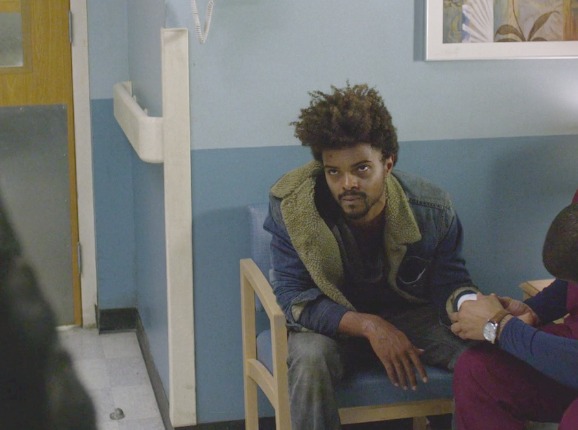
In later episodes, Jessica Jones gives its heroine’s callous treatment of Malcolm another terrible twist: Before he became a junkie, Malcolm was an aspiring social worker. Kilgrave hooked him on heroin in order to deploy as an under-the-radar spy against Jessica, who doesn’t notice her neighbor’s deception in part because his heroin habit hits a little too close to home—she copes with her trauma by keeping a bottle of blended scotch on her nightstand. It’s a development that de-glamorizes Jones’ “clever” diversion even further. When she uses Malcolm to defeat Kilgrave in the hospital, she’s not doing it in the name of justice, she’s playing into Kilgrave’s hands. The diversion, in fact, is something Kilgrave might do.
Kilgrave originally picked Jessica, after all, because of her inclination to play hero. When Kilgrave, portrayed as a gourmand who literally and figuratively orders luxury items off-menu, first sees Jones in the show, he is amused at her idealism (though appalled at her fashion sense). Her display of heroism makes her a target for a makeover: by stripping away the strength, Kilgrave turns her into a doll—he clothes her, feeds her, and treats her with everything he thinks a woman might want. Of course, his “gifts” strip from her of the pure sense of duty she originally possessed. When Jones is liberated from Kilgrave, the true violence and violation of her person manifests in the way Kilgrave has poisoned her idealism and her efforts to make a difference.
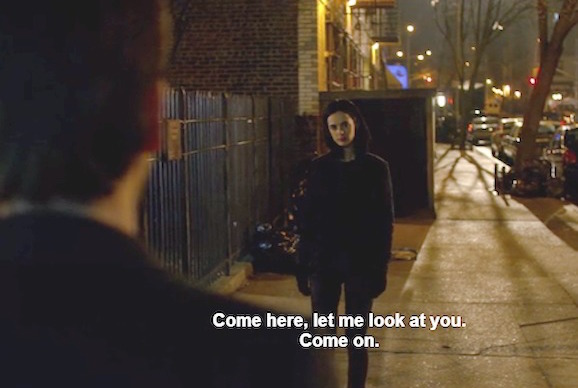
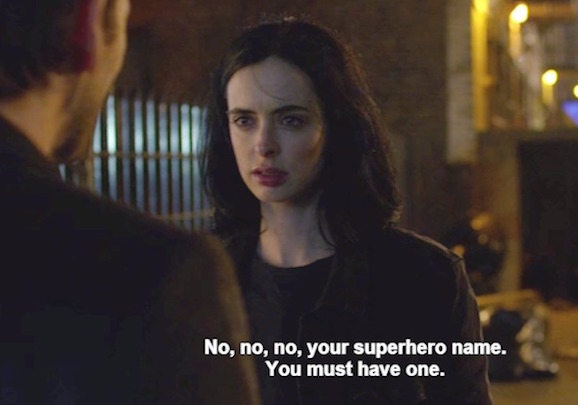
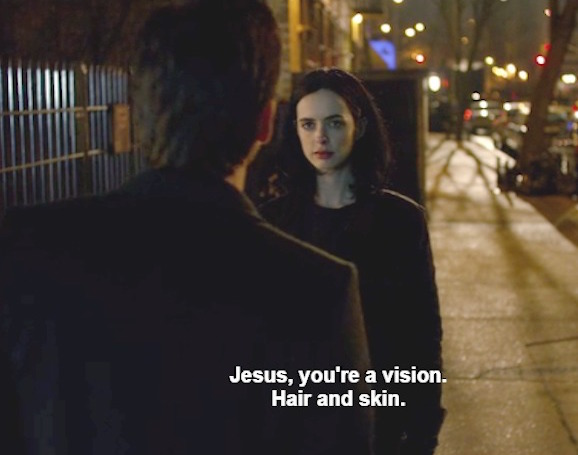
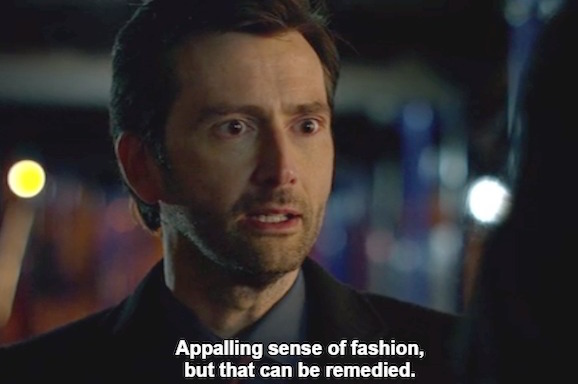
For those who have spent decades calling for more “Strong Female Characters” in entertainment, then, Jessica Jones is a parodically literal response: She is strong and she is female, but being neither charismatic nor a role model, she exposes the phrase’s hidden connotations. This nuance—which sets Jessica Jones apart from merely being the feminist’s answer to the antihero trend—is a timely one.
Jessica Jones comes to the fore just as the male-dominated second “Golden Age” of television has crested. Breaking Bad, Mad Men, The Sopranos, and The Wire aren’t on the air any longer; instead, today’s prestige television tends to be dominated by female-driven ensemble comedy-dramas, shows like Orange Is the New Black, Doll & Em, Orphan Black, Getting on, and Transparent. If antihero shows were obsessed with the flaws of their protagonists, lovingly lingering in their narcissistic failings and violence, their successors, “TV’s New Girls’ Club,” tend to be characterized by what Lili Loofbourow calls “promiscuous protagonism,” in which anyone and everyone can be the show’s lead (and therefore no one monopolizes the stage.) Jessica Jones is part of this countertrend, even if she subverts the genre of Difficult Men from within: Though she begins the show alone, damaged, and feral, she ends it in the arms of a co-worker, a friend, and a sister.
When critics first dubbed Jessica Jones an “antihero,” I suspect many had not yet digested the entire 10-hour show. But first impressions can be misleading; where the show starts is not where it goes (or where it came from). Ultimately, the antihero costume Jessica wears at the beginning proves to be her response to spending months in captivity at the hands of a true sociopath—and Jessica Jones turns out to be showrunner Melissa Rosenberg’s response to a decade of “Difficult Men.” As Jessica learns, what begins as a means of self-defense and a survival strategy can become a prison. The show’s triumph is that she outgrows the costume.





